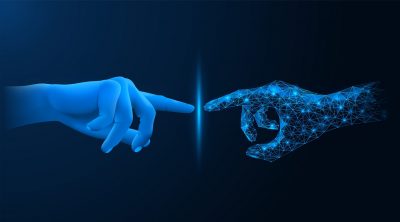ACE-EDI: Imagining the future of AI-augmented science experiments: can we trust machines with discovery?
Tuesday, April 12, 2022 from 3:30 pm to 4:30 pm
- None event

Through the combination of large experiments, big data sets, and powerful algorithms, we have an opportunity to imagine new avenues for improving scientific discovery. For example, artificial intelligence
(AI) has begun to have an impact on almost all fields of physics – on critical tasks like simulation, analysis, and even decision-making. In looking to the future, there is potential to use AI and related algorithms to further automate the full loop of the scientific method – from hypothesis generation to data acquisition and analysis. Closing the scientific loop creates opportunities for more efficient planning of experiments and exploration of new physics. However, this leaves us with multiple critical questions to address: how does this affect the role of scientists, who will have access to tools like this, how will we interpret the results of automated scientific pipelines?
Dr. Nord will discuss the potential of this approach in the context of recent work in cosmology and astronomy, showing progress and challenges in each major element of the scientific method as well as the roles and responsibilities of scientists in creating algorithmic tools that have implications and uses in society.
About the Presenter

Dr. Brian Nord
CASE associate, Department of Astronomy and Astrophysics
The University of Chicago
Brian’s work focuses on how to improve the ways in which we make scientific discoveries — developing algorithms, designing experiments, and re-envisioning research communities. Brian started his career in large-scale structure simulations. Since then, he has studied galaxy clusters, strong gravitational lensing, and the cosmic microwave background. More recently, he has explored the potential of artificial intelligence (AI) algorithms to address critical challenges in cosmological data analysis. Currently, he is integrating AI with rigorous statistical methods and using this to aid in the precise design of scientific experiments.
As a researcher in the Fermilab AI Project Office and Cosmic Physics Center, he provides strategic vision to the lab with respect to AI research investments. He has a joint appointment at the University Chicago, where he also conducts his AI research.
Brian is a leader in the movement to address inequities and oppression in academic and research environments. He co-created the academic #Strike4BlackLives (strike4blacklives.com) in June 2020 and works to drive anti-racist efforts and develop justice-oriented communities. He co-founded the Deep Skies Community (deepskieslab.ai), which is dedicated to shared leadership and prioritizing the humanity of research colleagues over productivity — one of the first of its kind. He is a co-author of ThisIsBlackLight.com, a curriculum for learning about Black experiences. He also co-founded the Change Now team, which produced a list of calls for action to make a more just laboratory environment at Fermi National Accelerator Laboratory.